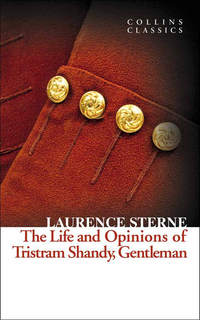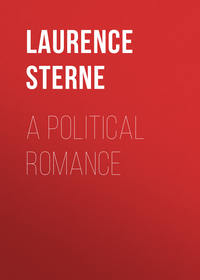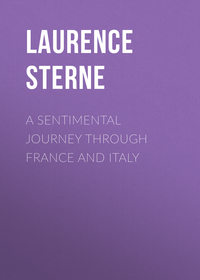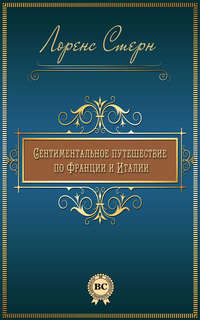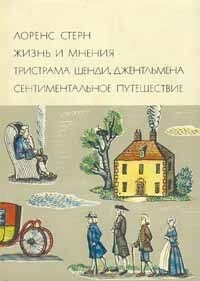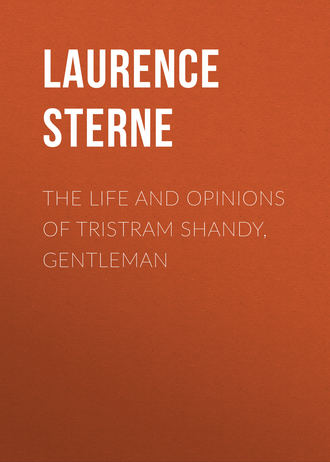
The Life and Opinions of Tristram Shandy, Gentleman
La Fosseuse drew her bodkin from the knot of her hair, and having traced the outline of a small whisker, with the blunt end of it, upon one side of her upper lip, put in into La Rebours' hand—La Rebours shook her head.
The Lady Baussiere coughed thrice into the inside of her muff—La Guyol smiled—Fy, said the Lady Baussiere. The queen of Navarre touched her eye with the tip of her fore-finger—as much as to say, I understand you all.
'Twas plain to the whole court the word was ruined: La Fosseuse had given it a wound, and it was not the better for passing through all these defiles—It made a faint stand, however, for a few months, by the expiration of which, the Sieur De Croix, finding it high time to leave Navarre for want of whiskers—the word in course became indecent, and (after a few efforts) absolutely unfit for use.
The best word, in the best language of the best world, must have suffered under such combinations.—The curate of d'Estella wrote a book against them, setting forth the dangers of accessory ideas, and warning the Navarois against them.
Does not all the world know, said the curate d'Estella at the conclusion of his work, that Noses ran the same fate some centuries ago in most parts of Europe, which Whiskers have now done in the kingdom of Navarre?—The evil indeed spread no farther then—but have not beds and bolsters, and night-caps and chamber-pots stood upon the brink of destruction ever since? Are not trouse, and placket-holes, and pump-handles—and spigots and faucets, in danger still from the same association?—Chastity, by nature, the gentlest of all affections—give it but its head—'tis like a ramping and a roaring lion.
The drift of the curate d'Estella's argument was not understood.—They ran the scent the wrong way.—The world bridled his ass at the tail.—And when the extremes of Delicacy, and the beginnings of Concupiscence, hold their next provincial chapter together, they may decree that bawdy also.
Chapter 3.II
When my father received the letter which brought him the melancholy account of my brother Bobby's death, he was busy calculating the expence of his riding post from Calais to Paris, and so on to Lyons.
'Twas a most inauspicious journey; my father having had every foot of it to travel over again, and his calculation to begin afresh, when he had almost got to the end of it, by Obadiah's opening the door to acquaint him the family was out of yeast—and to ask whether he might not take the great coach-horse early in the morning and ride in search of some.—With all my heart, Obadiah, said my father (pursuing his journey)—take the coach-horse, and welcome.—But he wants a shoe, poor creature! said Obadiah.—Poor creature! said my uncle Toby, vibrating the note back again, like a string in unison. Then ride the Scotch horse, quoth my father hastily.—He cannot bear a saddle upon his back, quoth Obadiah, for the whole world.—The devil's in that horse; then take Patriot, cried my father, and shut the door.—Patriot is sold, said Obadiah. Here's for you! cried my father, making a pause, and looking in my uncle Toby's face, as if the thing had not been a matter of fact.—Your worship ordered me to sell him last April, said Obadiah.—Then go on foot for your pains, cried my father—I had much rather walk than ride, said Obadiah, shutting the door.
What plagues, cried my father, going on with his calculation.—But the waters are out, said Obadiah,—opening the door again.
Till that moment, my father, who had a map of Sanson's, and a book of the post-roads before him, had kept his hand upon the head of his compasses, with one foot of them fixed upon Nevers, the last stage he had paid for—purposing to go on from that point with his journey and calculation, as soon as Obadiah quitted the room: but this second attack of Obadiah's, in opening the door and laying the whole country under water, was too much.—He let go his compasses—or rather with a mixed motion between accident and anger, he threw them upon the table; and then there was nothing for him to do, but to return back to Calais (like many others) as wise as he had set out.
When the letter was brought into the parlour, which contained the news of my brother's death, my father had got forwards again upon his journey to within a stride of the compasses of the very same stage of Nevers.—By your leave, Mons. Sanson, cried my father, striking the point of his compasses through Nevers into the table—and nodding to my uncle Toby to see what was in the letter—twice of one night, is too much for an English gentleman and his son, Mons. Sanson, to be turned back from so lousy a town as Nevers—What think'st thou, Toby? added my father in a sprightly tone.—Unless it be a garrison town, said my uncle Toby—for then—I shall be a fool, said my father, smiling to himself, as long as I live.—So giving a second nod—and keeping his compasses still upon Nevers with one hand, and holding his book of the post-roads in the other—half calculating and half listening, he leaned forwards upon the table with both elbows, as my uncle Toby hummed over the letter.
he's gone! said my uncle Toby—Where—Who? cried my father.—My nephew, said my uncle Toby.—What—without leave—without money—without governor? cried my father in amazement. No:—he is dead, my dear brother, quoth my uncle Toby.—Without being ill? cried my father again.—I dare say not, said my uncle Toby, in a low voice, and fetching a deep sigh from the bottom of his heart, he has been ill enough, poor lad! I'll answer for him—for he is dead.
When Agrippina was told of her son's death, Tacitus informs us, that, not being able to moderate the violence of her passions, she abruptly broke off her work—My father stuck his compasses into Nevers, but so much the faster.—What contrarieties! his, indeed, was matter of calculation!—Agrippina's must have been quite a different affair; who else could pretend to reason from history?
How my father went on, in my opinion, deserves a chapter to itself.—
Chapter 3.III
—And a chapter it shall have, and a devil of a one too—so look to yourselves.
'Tis either Plato, or Plutarch, or Seneca, or Xenophon, or Epictetus, or Theophrastus, or Lucian—or some one perhaps of later date—either Cardan, or Budaeus, or Petrarch, or Stella—or possibly it may be some divine or father of the church, St. Austin, or St. Cyprian, or Barnard, who affirms that it is an irresistible and natural passion to weep for the loss of our friends or children—and Seneca (I'm positive) tells us somewhere, that such griefs evacuate themselves best by that particular channel—And accordingly we find, that David wept for his son Absalom—Adrian for his Antinous—Niobe for her children, and that Apollodorus and Crito both shed tears for Socrates before his death.
My father managed his affliction otherwise; and indeed differently from most men either ancient or modern; for he neither wept it away, as the Hebrews and the Romans—or slept it off, as the Laplanders—or hanged it, as the English, or drowned it, as the Germans,—nor did he curse it, or damn it, or excommunicate it, or rhyme it, or lillabullero it.—
–He got rid of it, however.
Will your worships give me leave to squeeze in a story between these two pages?
When Tully was bereft of his dear daughter Tullia, at first he laid it to his heart,—he listened to the voice of nature, and modulated his own unto it.—O my Tullia! my daughter! my child!—still, still, still,—'twas O my Tullia!—my Tullia! Methinks I see my Tullia, I hear my Tullia, I talk with my Tullia.—But as soon as he began to look into the stores of philosophy, and consider how many excellent things might be said upon the occasion—no body upon earth can conceive, says the great orator, how happy, how joyful it made me.
My father was as proud of his eloquence as Marcus Tullius Cicero could be for his life, and, for aught I am convinced of to the contrary at present, with as much reason: it was indeed his strength—and his weakness too.—His strength—for he was by nature eloquent; and his weakness—for he was hourly a dupe to it; and, provided an occasion in life would but permit him to shew his talents, or say either a wise thing, a witty, or a shrewd one—(bating the case of a systematic misfortune)—he had all he wanted.—A blessing which tied up my father's tongue, and a misfortune which let it loose with a good grace, were pretty equal: sometimes, indeed, the misfortune was the better of the two; for instance, where the pleasure of the harangue was as ten, and the pain of the misfortune but as five—my father gained half in half, and consequently was as well again off, as if it had never befallen him.
This clue will unravel what otherwise would seem very inconsistent in my father's domestic character; and it is this, that, in the provocations arising from the neglects and blunders of servants, or other mishaps unavoidable in a family, his anger, or rather the duration of it, eternally ran counter to all conjecture.
My father had a favourite little mare, which he had consigned over to a most beautiful Arabian horse, in order to have a pad out of her for his own riding: he was sanguine in all his projects; so talked about his pad every day with as absolute a security, as if it had been reared, broke,—and bridled and saddled at his door ready for mounting. By some neglect or other in Obadiah, it so fell out, that my father's expectations were answered with nothing better than a mule, and as ugly a beast of the kind as ever was produced.
My mother and my uncle Toby expected my father would be the death of Obadiah—and that there never would be an end of the disaster—See here! you rascal, cried my father, pointing to the mule, what you have done!—It was not me, said Obadiah.—How do I know that? replied my father.
Triumph swam in my father's eyes, at the repartee—the Attic salt brought water into them—and so Obadiah heard no more about it.
Now let us go back to my brother's death.
Philosophy has a fine saying for every thing.—For Death it has an entire set; the misery was, they all at once rushed into my father's head, that 'twas difficult to string them together, so as to make any thing of a consistent show out of them.—He took them as they came.
''Tis an inevitable chance—the first statute in Magna Charta—it is an everlasting act of parliament, my dear brother,—All must die.
'If my son could not have died, it had been matter of wonder,—not that he is dead.
'Monarchs and princes dance in the same ring with us.
'—To die, is the great debt and tribute due unto nature: tombs and monuments, which should perpetuate our memories, pay it themselves; and the proudest pyramid of them all, which wealth and science have erected, has lost its apex, and stands obtruncated in the traveller's horizon.' (My father found he got great ease, and went on)—'Kingdoms and provinces, and towns and cities, have they not their periods? and when those principles and powers, which at first cemented and put them together, have performed their several evolutions, they fall back.'—Brother Shandy, said my uncle Toby, laying down his pipe at the word evolutions—Revolutions, I meant, quoth my father,—by heaven! I meant revolutions, brother Toby—evolutions is nonsense.—'Tis not nonsense—said my uncle Toby.—But is it not nonsense to break the thread of such a discourse upon such an occasion? cried my father—do not—dear Toby, continued he, taking him by the hand, do not—do not, I beseech thee, interrupt me at this crisis.—My uncle Toby put his pipe into his mouth.
'Where is Troy and Mycenae, and Thebes and Delos, and Persepolis and Agrigentum?'—continued my father, taking up his book of post-roads, which he had laid down.—'What is become, brother Toby, of Nineveh and Babylon, of Cizicum and Mitylenae? The fairest towns that ever the sun rose upon, are now no more; the names only are left, and those (for many of them are wrong spelt) are falling themselves by piece-meals to decay, and in length of time will be forgotten, and involved with every thing in a perpetual night: the world itself, brother Toby, must—must come to an end.
'Returning out of Asia, when I sailed from Aegina towards Megara,' (when can this have been? thought my uncle Toby,) 'I began to view the country round about. Aegina was behind me, Megara was before, Pyraeus on the right hand, Corinth on the left.—What flourishing towns now prostrate upon the earth! Alas! alas! said I to myself, that man should disturb his soul for the loss of a child, when so much as this lies awfully buried in his presence—Remember, said I to myself again—remember thou art a man.'—
Now my uncle Toby knew not that this last paragraph was an extract of Servius Sulpicius's consolatory letter to Tully.—He had as little skill, honest man, in the fragments, as he had in the whole pieces of antiquity.—And as my father, whilst he was concerned in the Turkey trade, had been three or four different times in the Levant, in one of which he had stayed a whole year and an half at Zant, my uncle Toby naturally concluded, that, in some one of these periods, he had taken a trip across the Archipelago into Asia; and that all this sailing affair with Aegina behind, and Megara before, and Pyraeus on the right hand, &c. &c. was nothing more than the true course of my father's voyage and reflections.—'Twas certainly in his manner, and many an undertaking critic would have built two stories higher upon worse foundations.—And pray, brother, quoth my uncle Toby, laying the end of his pipe upon my father's hand in a kindly way of interruption—but waiting till he finished the account—what year of our Lord was this?—'Twas no year of our Lord, replied my father.—That's impossible, cried my uncle Toby.—Simpleton! said my father,—'twas forty years before Christ was born.
My uncle Toby had but two things for it; either to suppose his brother to be the wandering Jew, or that his misfortunes had disordered his brain.—'May the Lord God of heaven and earth protect him and restore him!' said my uncle Toby, praying silently for my father, and with tears in his eyes.
–My father placed the tears to a proper account, and went on with his harangue with great spirit.
'There is not such great odds, brother Toby, betwixt good and evil, as the world imagines'—(this way of setting off, by the bye, was not likely to cure my uncle Toby's suspicions).—'Labour, sorrow, grief, sickness, want, and woe, are the sauces of life.'—Much good may do them—said my uncle Toby to himself.—
'My son is dead!—so much the better;—'tis a shame in such a tempest to have but one anchor.
'But he is gone for ever from us!—be it so. He is got from under the hands of his barber before he was bald—he is but risen from a feast before he was surfeited—from a banquet before he had got drunken.
'The Thracians wept when a child was born,'—(and we were very near it, quoth my uncle Toby,)—'and feasted and made merry when a man went out of the world; and with reason.—Death opens the gate of fame, and shuts the gate of envy after it,—it unlooses the chain of the captive, and puts the bondsman's task into another man's hands.
'Shew me the man, who knows what life is, who dreads it, and I'll shew thee a prisoner who dreads his liberty.'
Is it not better, my dear brother Toby, (for mark—our appetites are but diseases,)—is it not better not to hunger at all, than to eat?—not to thirst, than to take physic to cure it?
Is it not better to be freed from cares and agues, from love and melancholy, and the other hot and cold fits of life, than, like a galled traveller, who comes weary to his inn, to be bound to begin his journey afresh?
There is no terrour, brother Toby, in its looks, but what it borrows from groans and convulsions—and the blowing of noses and the wiping away of tears with the bottoms of curtains, in a dying man's room.—Strip it of these, what is it?—'Tis better in battle than in bed, said my uncle Toby.—Take away its hearses, its mutes, and its mourning,—its plumes, scutcheons, and other mechanic aids—What is it?—Better in battle! continued my father, smiling, for he had absolutely forgot my brother Bobby—'tis terrible no way—for consider, brother Toby,—when we are—death is not;—and when death is—we are not. My uncle Toby laid down his pipe to consider the proposition; my father's eloquence was too rapid to stay for any man—away it went,—and hurried my uncle Toby's ideas along with it.—
For this reason, continued my father, 'tis worthy to recollect, how little alteration, in great men, the approaches of death have made.—Vespasian died in a jest upon his close-stool—Galba with a sentence—Septimus Severus in a dispatch—Tiberius in dissimulation, and Caesar Augustus in a compliment.—I hope 'twas a sincere one—quoth my uncle Toby.
–'Twas to his wife,—said my father.
Chapter 3.IV
—And lastly—for all the choice anecdotes which history can produce of this matter, continued my father,—this, like the gilded dome which covers in the fabric—crowns all.—
'Tis of Cornelius Gallus, the praetor—which, I dare say, brother Toby, you have read.—I dare say I have not, replied my uncle.—He died, said my father as…—And if it was with his wife, said my uncle Toby—there could be no hurt in it.—That's more than I know—replied my father.
Chapter 3.V
My mother was going very gingerly in the dark along the passage which led to the parlour, as my uncle Toby pronounced the word wife.—'Tis a shrill penetrating sound of itself, and Obadiah had helped it by leaving the door a little a-jar, so that my mother heard enough of it to imagine herself the subject of the conversation; so laying the edge of her finger across her two lips—holding in her breath, and bending her head a little downwards, with a twist of her neck—(not towards the door, but from it, by which means her ear was brought to the chink)—she listened with all her powers:—the listening slave, with the Goddess of Silence at his back, could not have given a finer thought for an intaglio.
In this attitude I am determined to let her stand for five minutes: till I bring up the affairs of the kitchen (as Rapin does those of the church) to the same period.
Chapter 3.VI
Though in one sense, our family was certainly a simple machine, as it consisted of a few wheels; yet there was thus much to be said for it, that these wheels were set in motion by so many different springs, and acted one upon the other from such a variety of strange principles and impulses—that though it was a simple machine, it had all the honour and advantages of a complex one,—and a number of as odd movements within it, as ever were beheld in the inside of a Dutch silk-mill.
Amongst these there was one, I am going to speak of, in which, perhaps, it was not altogether so singular, as in many others; and it was this, that whatever motion, debate, harangue, dialogue, project, or dissertation, was going forwards in the parlour, there was generally another at the same time, and upon the same subject, running parallel along with it in the kitchen.
Now to bring this about, whenever an extraordinary message, or letter, was delivered in the parlour—or a discourse suspended till a servant went out—or the lines of discontent were observed to hang upon the brows of my father or mother—or, in short, when any thing was supposed to be upon the tapis worth knowing or listening to, 'twas the rule to leave the door, not absolutely shut, but somewhat a-jar—as it stands just now,—which, under covert of the bad hinge, (and that possibly might be one of the many reasons why it was never mended,) it was not difficult to manage; by which means, in all these cases, a passage was generally left, not indeed as wide as the Dardanelles, but wide enough, for all that, to carry on as much of this windward trade, as was sufficient to save my father the trouble of governing his house;—my mother at this moment stands profiting by it.—Obadiah did the same thing, as soon as he had left the letter upon the table which brought the news of my brother's death, so that before my father had well got over his surprise, and entered upon his harangue,—had Trim got upon his legs, to speak his sentiments upon the subject.
A curious observer of nature, had he been worth the inventory of all Job's stock—though by the bye, your curious observers are seldom worth a groat—would have given the half of it, to have heard Corporal Trim and my father, two orators so contrasted by nature and education, haranguing over the same bier.
My father—a man of deep reading—prompt memory—with Cato, and Seneca, and Epictetus, at his fingers ends.—
The corporal—with nothing—to remember—of no deeper reading than his muster-roll—or greater names at his fingers end, than the contents of it.
The one proceeding from period to period, by metaphor and allusion, and striking the fancy as he went along (as men of wit and fancy do) with the entertainment and pleasantry of his pictures and images.
The other, without wit or antithesis, or point, or turn, this way or that; but leaving the images on one side, and the picture on the other, going straight forwards as nature could lead him, to the heart. O Trim! would to heaven thou had'st a better historian!—would!—thy historian had a better pair of breeches!—O ye critics! will nothing melt you?
Chapter 3.VII
—My young master in London is dead? said Obadiah.——A green sattin night-gown of my mother's, which had been twice scoured, was the first idea which Obadiah's exclamation brought into Susannah's head.—Well might Locke write a chapter upon the imperfections of words.—Then, quoth Susannah, we must all go into mourning.—But note a second time: the word mourning, notwithstanding Susannah made use of it herself—failed also of doing its office; it excited not one single idea, tinged either with grey or black,—all was green.—The green sattin night-gown hung there still.
–O! 'twill be the death of my poor mistress, cried Susannah.—My mother's whole wardrobe followed.—What a procession! her red damask,—her orange tawney,—her white and yellow lutestrings,—her brown taffata,—her bone-laced caps, her bed-gowns, and comfortable under-petticoats.—Not a rag was left behind.—'No,—she will never look up again,' said Susannah.
We had a fat, foolish scullion—my father, I think, kept her for her simplicity;—she had been all autumn struggling with a dropsy.—He is dead, said Obadiah,—he is certainly dead!—So am not I, said the foolish scullion.
–Here is sad news, Trim, cried Susannah, wiping her eyes as Trim stepp'd into the kitchen,—master Bobby is dead and buried—the funeral was an interpolation of Susannah's—we shall have all to go into mourning, said Susannah.
I hope not, said Trim.—You hope not! cried Susannah earnestly.—The mourning ran not in Trim's head, whatever it did in Susannah's.—I hope—said Trim, explaining himself, I hope in God the news is not true. I heard the letter read with my own ears, answered Obadiah; and we shall have a terrible piece of work of it in stubbing the ox-moor.—Oh! he's dead, said Susannah.—As sure, said the scullion, as I'm alive.
I lament for him from my heart and my soul, said Trim, fetching a sigh.—Poor creature!—poor boy!—poor gentleman!
–He was alive last Whitsontide! said the coachman.—Whitsontide! alas! cried Trim, extending his right arm, and falling instantly into the same attitude in which he read the sermon,—what is Whitsontide, Jonathan (for that was the coachman's name), or Shrovetide, or any tide or time past, to this? Are we not here now, continued the corporal (striking the end of his stick perpendicularly upon the floor, so as to give an idea of health and stability)—and are we not—(dropping his hat upon the ground) gone! in a moment!—'Twas infinitely striking! Susannah burst into a flood of tears.—We are not stocks and stones.—Jonathan, Obadiah, the cook-maid, all melted.—The foolish fat scullion herself, who was scouring a fish-kettle upon her knees, was rous'd with it.—The whole kitchen crowded about the corporal.
Now, as I perceive plainly, that the preservation of our constitution in church and state,—and possibly the preservation of the whole world—or what is the same thing, the distribution and balance of its property and power, may in time to come depend greatly upon the right understanding of this stroke of the corporal's eloquence—I do demand your attention—your worships and reverences, for any ten pages together, take them where you will in any other part of the work, shall sleep for it at your ease.


